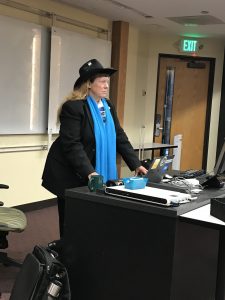This post was written by Shari Siegel ’18
L. Hunter Lovins, the dynamic President and Founder of Natural Capitalism Solutions, recently spent the day with The Sustainable Innovation MBA Class of 2018. Sporting her signature Stetson hat, Ms. Lovins shared the story of the evolution of her career as a pioneer in sustainable development, and using market-based solutions to forge a better future for ourselves and the planet.
 Ms. Lovins first came to prominence as one of the co-authors of the book Natural Capitalism, which was later summarized in the Harvard Business Review. It was the first major publication to posit that the value of the “services” provided by the earth’s ecosystem (such as forests that provide water storage and habitats) were not being accounted for when assessing the costs of natural resources extraction or other economic activity. She and her co-authors, Amory Lovins and Paul Hawken, argued persuasively that the companies that incorporated this insight into their own business plans would improve both the health of the planet and their own bottom lines.
Ms. Lovins first came to prominence as one of the co-authors of the book Natural Capitalism, which was later summarized in the Harvard Business Review. It was the first major publication to posit that the value of the “services” provided by the earth’s ecosystem (such as forests that provide water storage and habitats) were not being accounted for when assessing the costs of natural resources extraction or other economic activity. She and her co-authors, Amory Lovins and Paul Hawken, argued persuasively that the companies that incorporated this insight into their own business plans would improve both the health of the planet and their own bottom lines.
Ms Lovins consults on sustainable agriculture, energy, water, security and climate policies for numerous businesses, communities and governments all over the world, and she generously shared some of her experiences with different types of engagements and some unlikely partnerships around the world. For example, in the course of her work and travels, Ms. Lovins found a partner in the U.S. military to help bring renewable energy to remote parts of Afghanistan. Renewables not only rely on resources such as wind, sun and flowing water, which are abundant in Afghanistan; they also have a lower heat signature than the traditional diesel-run generators that were being used. In addition, she noted that sunflowers and other oil-producing crops that could be used for biodiesel, could replace poppies as farm crops giving farmers a “legitimate” source of income. Thus, renewable energy can also be generated on a distributed basis creating both jobs and power in remote locations. Ms. Lovins has published her thoughts on “Green Afghanistan.”
Students were encouraged to think about the new narrative that will drive the future and to consider the challenges that will be wrought as we approach the popping of the “carbon bubble.” The coming change is becoming increasingly apparent: Siemens Capital is moving from fossil fuels to clean energy investments; China is about to ban the internal combustion engine; Dubai is producing solar energy at 2 cents per kwh; and the Kentucky Coal Museum is now solar powered. These developments and others provoke numerous questions about what is going to happen when the $22 trillion in assets related to fossil fuels currently on balance sheets are stranded.
The examples shared with the class illustrated nicely the challenges and opportunities Ms. Lovins sees for Sustainable Innovation MBA students and others seeking to forge a sustainable, or better yet, a regenerative future. It is long past time for systems thinking. Production need not lead to more and more waste. For example, new companies such as Lanza Tech have realized that carbon is most useful when it is in the soil, so they have developed products and processes to put it back there.
Ms Lovins’s advice and parting thoughts:
- Markets, finance and business can be a powerful force to achieve beneficial results in the world.
- Addressing sustainability issues isn’t just the right thing to do; it’s the profitable thing to do.
- Remember that Adam Smith was not focused on “whoever dies with the most toys wins,” but rather on how nations can have sufficient capital for their people to be fed and happy.
- Go to the communities you want to help and say “here is what I do, in case it’s of any use to you, it’s on offer.”
- Invest in sustainable businesses and technologies.
- Finally, simply try to do one thing every day – no matter how small – to move the needle in the right direction.
